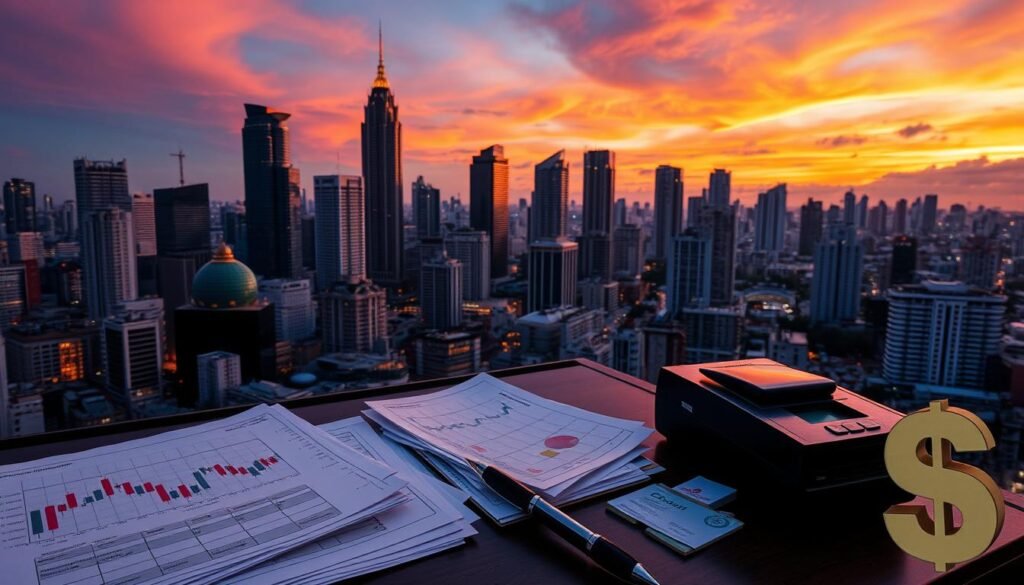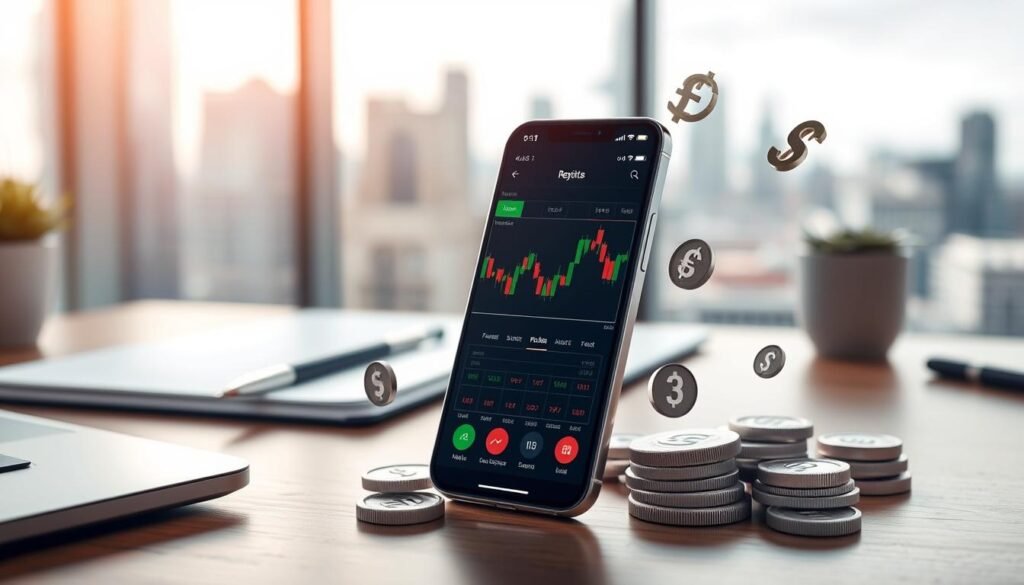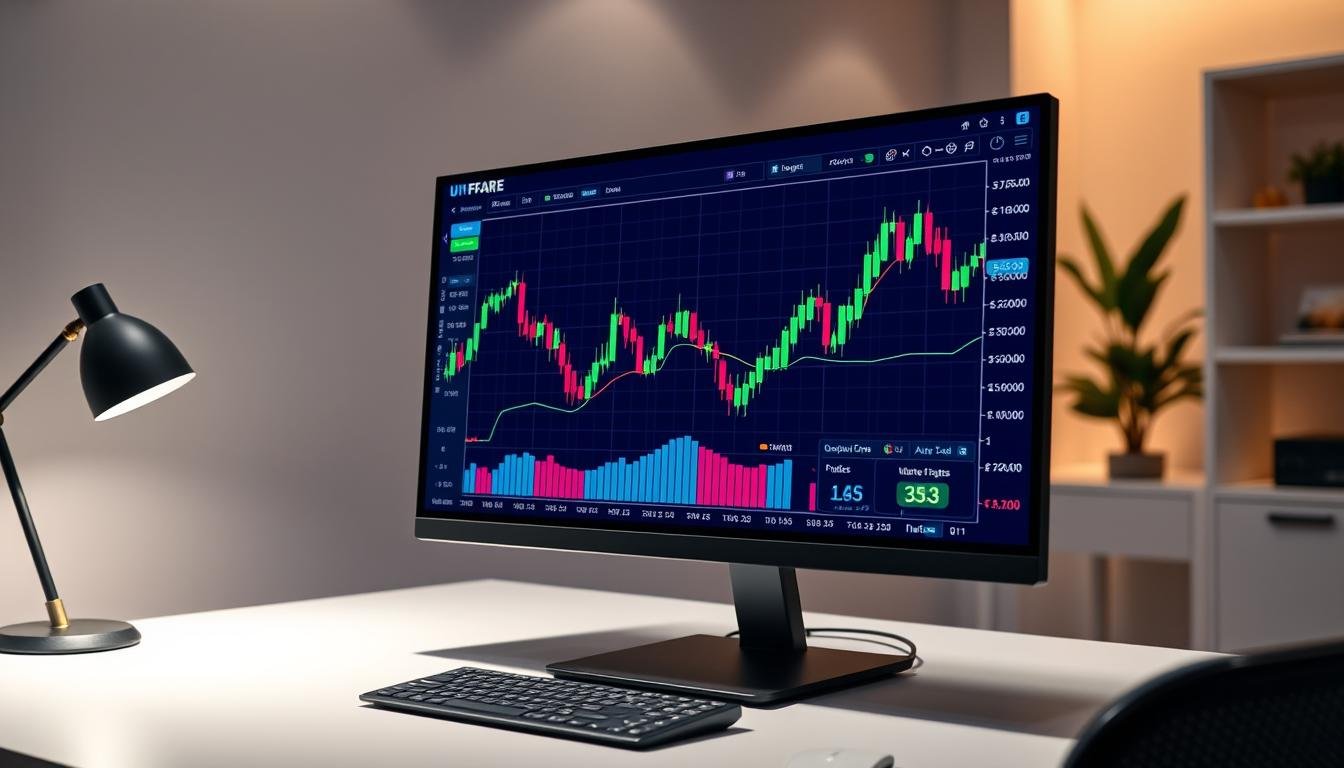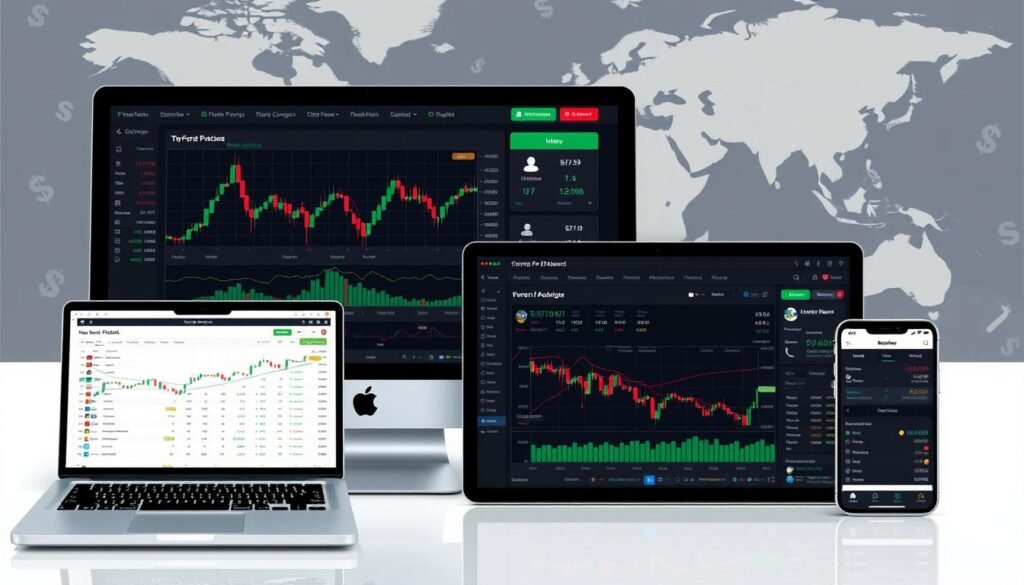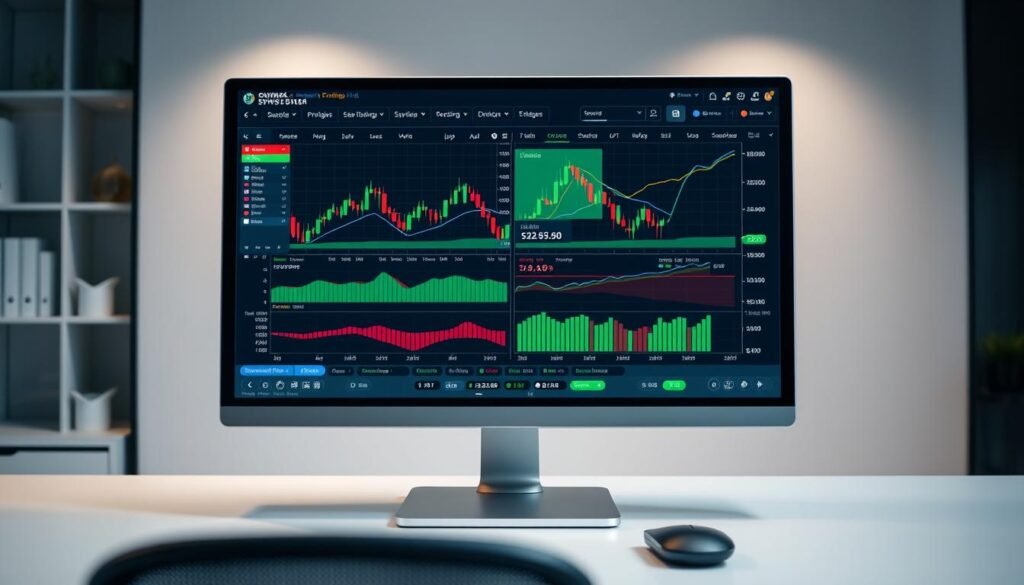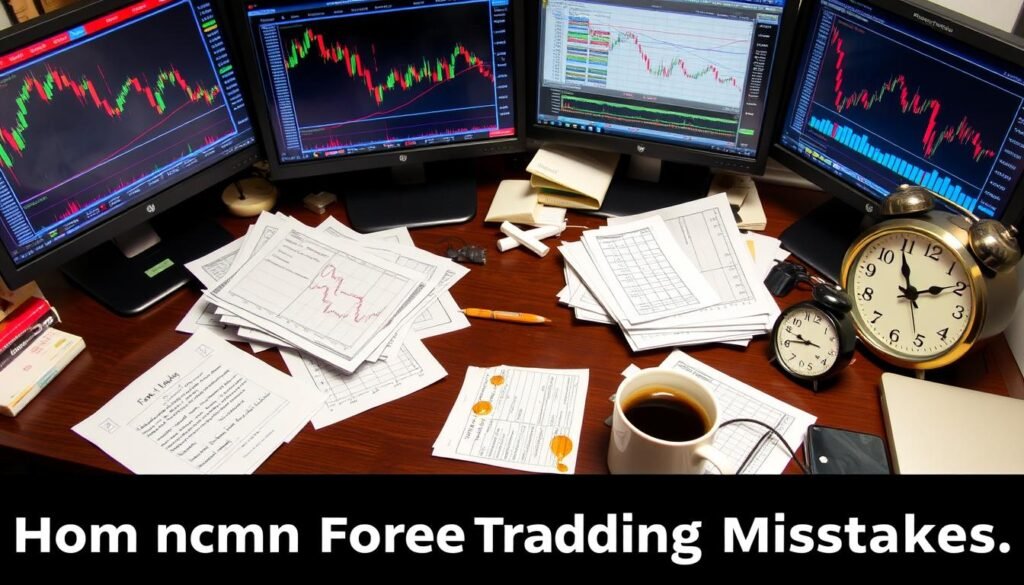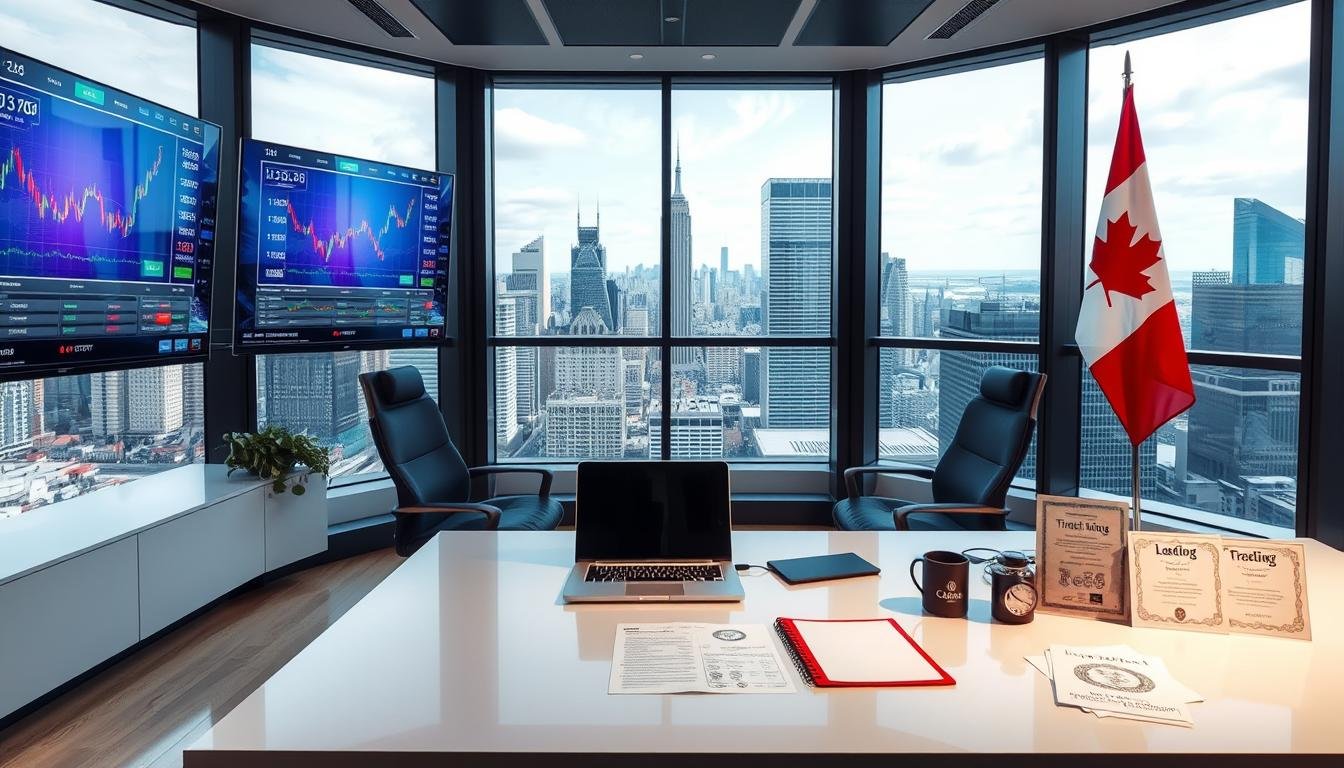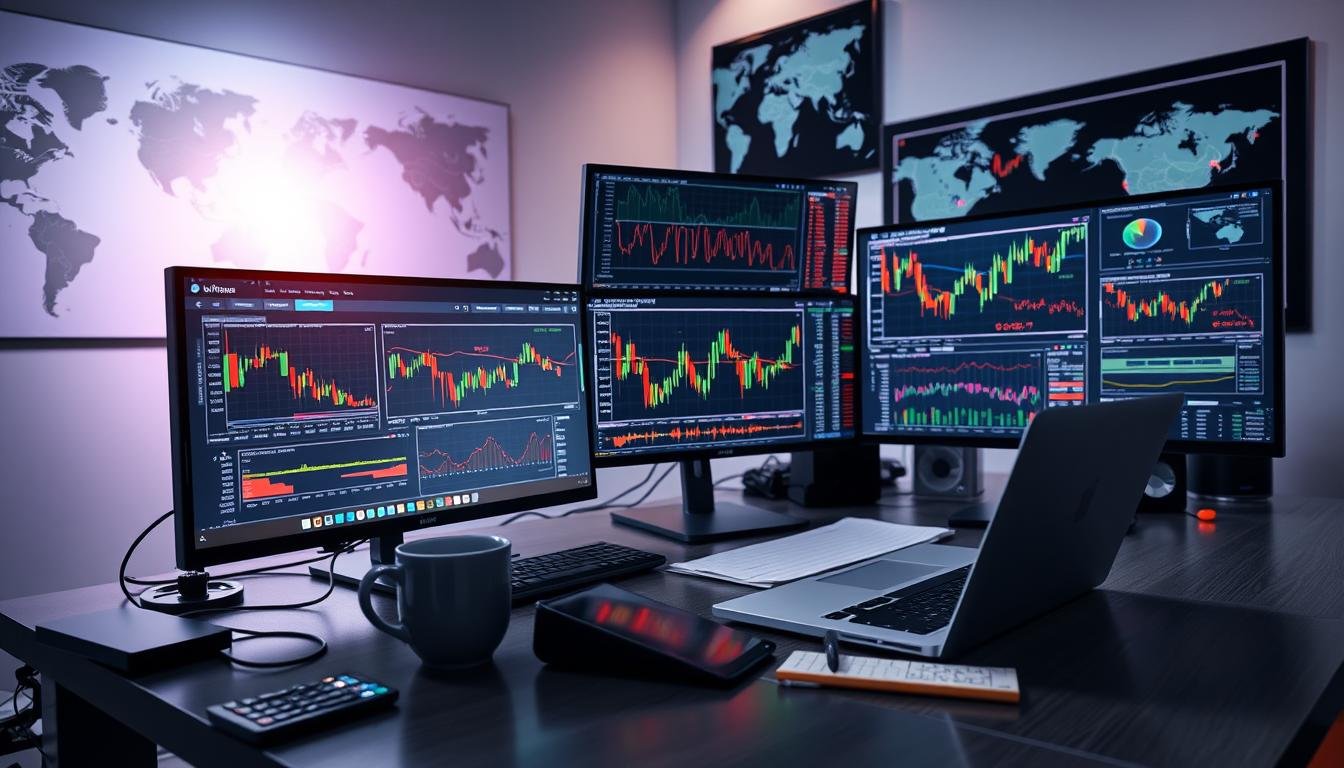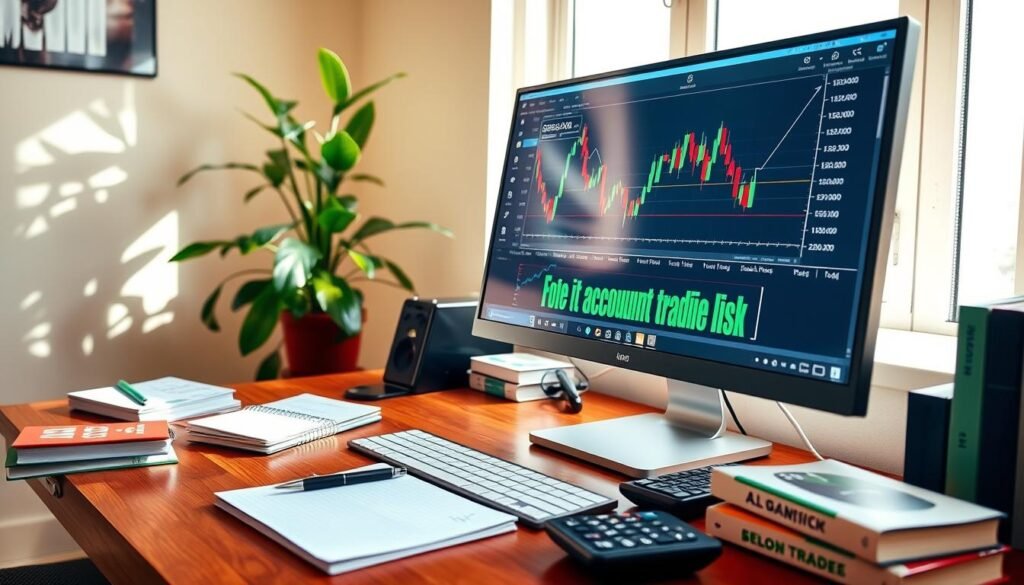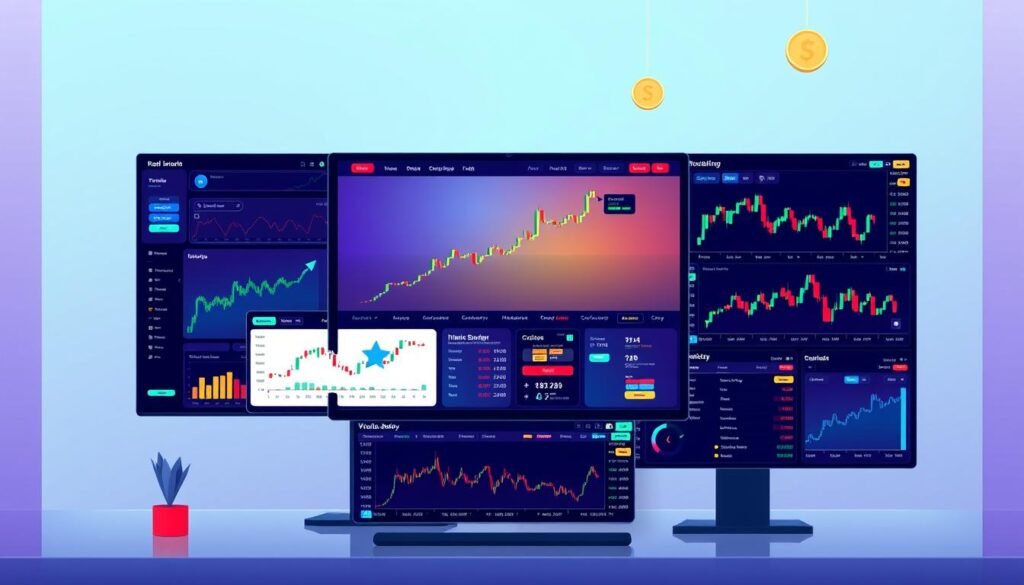Regulated Forex Brokers: Secure Trading Options
In the fast-paced world of forex trading, picking a regulated broker is key. These brokers are watched by top regulatory bodies. This means your money is safe and trading is fair.
By going with a regulated broker, you can trade with confidence. You know strict rules and checks are in place to protect your money.
This article dives deep into why forex regulation matters. It shows how it helps traders. We’ll look at big regulatory groups like the FCA in the UK, the NFA and CFTC in the US, and ASIC in Australia.
Knowing about these groups helps traders pick the right broker. It’s all about making smart choices for a safe trading path.
We’ll share tips on finding reliable regulated forex brokers. This is important for both new and seasoned traders. Knowing about forex regulation and choosing the right broker is key for safe trading.
Key Takeaways
- Regulated forex brokers offer a safe and reliable place to trade. They protect your money and ensure fair play.
- Big regulatory bodies like the FCA, NFA, CFTC, and ASIC keep the forex market in check. They make sure brokers follow the rules.
- Choosing a regulated broker has many benefits. It means your money is safe, trading is fair, and you have a place to turn if things go wrong.
- Before trading, always check if your broker is regulated and licensed. This ensures you’re working with a legitimate and compliant broker.
- Regulated brokers follow rules on leverage, margin, and investor protection. This makes the market more stable and builds trust among investors.
The Importance of Choosing a Regulated Forex Broker
Choosing a regulated forex broker is crucial for traders. These brokers follow strict rules and are transparent. This means your money is safe and you’re protected from scams.
Trading with a regulated broker means fair play. They follow rules from bodies like the FCA or NFA. This ensures prices are clear, orders are fair, and your money is safe.
Regulated forex brokers undergo regular audits and are subject to strict reporting requirements, ensuring that they maintain a high level of financial stability and operational integrity.
Another key benefit is fund protection. Regulated brokers keep your money separate from theirs. This way, your funds are safe, even if the broker faces financial trouble.
Choosing a regulated broker over an unregulated one is wise. Here’s why:
- Regulated brokers are more transparent and accountable
- They offer a safer trading space, reducing fraud risks
- Traders can solve disputes and seek legal help if needed
Unregulated brokers, however, pose big risks. They might manipulate prices or delay payments. Trading with them can lead to financial loss and little protection.
| Regulated Forex Brokers | Unregulated Forex Brokers |
|---|---|
| Supervised by reputable financial authorities | Lack oversight and accountability |
| Adhere to strict guidelines and regulations | May engage in unethical practices |
| Provide transparency and fair trading conditions | Lack transparency and may manipulate prices |
| Segregate client funds for protection | May mishandle or misuse client funds |
| Offer dispute resolution and legal recourse | Provide little to no protection for traders |
In summary, picking a regulated forex broker is key for a safe trading experience. It ensures your money is secure and you can trade with confidence.
Understanding Forex Regulation and Its Benefits
Forex regulation is key to a fair and safe trading space for investors. It sets strict rules and watches over the market. This helps keep traders safe and the market honest. Let’s look at how regulation helps investors.
Protection of Trader Funds
Forex regulation’s main goal is to keep traders’ money safe. Regulated brokers keep client money separate from their own. This makes sure traders’ money is safe and easy to get to.
Brokers also have to have enough money to cover losses. This helps prevent them from going bankrupt. It keeps traders’ money safe from broker mistakes or scams.
Ensuring Fair Trading Practices
Regulatory bodies make sure trading is fair. They require brokers to be open about prices and not cheat on trades. This makes sure everyone has a fair chance.
By following these forex trading rules, brokers keep the market honest. Traders can trust that their trades are fair and follow market rules.
Recourse in Case of Disputes
If there’s a problem with a regulated broker, traders can get help. Regulatory bodies have ways to solve complaints and check for wrongdoing. If a trader has a problem, they can turn to the regulatory body for support.
“Forex regulation is essential for maintaining market stability and protecting investors’ interests. By enforcing strict guidelines and oversight, regulatory bodies create a safe and fair trading environment for all participants.”
Forex regulation does more than protect traders. It also makes the market stable and boosts investor trust. When traders feel safe, they trade more. This makes the market more liquid and healthy.
In short, forex regulation has many benefits. It protects funds, ensures fair trading, and offers help in disputes. By focusing on investor protection measures, regulatory bodies make a strong and reliable trading environment for everyone.
Key Regulatory Bodies in the Forex Industry
The forex market is global and open 24/7. It’s where currencies are traded every day. Several regulatory bodies around the world watch over it. They make sure trading is fair and protect investors.
Financial Conduct Authority (FCA) – United Kingdom
The Financial Conduct Authority (FCA) oversees forex brokers in the UK. It’s known for strict rules and high standards. FCA-regulated brokers must keep client funds separate and follow clear rules.
National Futures Association (NFA) and Commodity Futures Trading Commission (CFTC) – United States
In the US, the National Futures Association (NFA) and the Commodity Futures Trading Commission (CFTC) regulate forex brokers. The NFA works with the CFTC to protect investors. Brokers must meet strict capital requirements and follow rules.
Australian Securities and Investments Commission (ASIC) – Australia
The Australian Securities and Investments Commission (ASIC) regulates forex brokers in Australia. ASIC has a strong focus on market integrity and consumer protection. Brokers need an Australian Financial Services (AFS) license to operate.
These regulatory bodies work together to keep the forex market fair. They share information to stop fraud and unfair practices. It’s important to choose a broker regulated by these bodies.
| Regulatory Body | Region | Key Responsibilities |
|---|---|---|
| Financial Conduct Authority (FCA) | United Kingdom | Ensures compliance with strict financial regulations, client fund segregation, and adequate capital reserves |
| National Futures Association (NFA) and Commodity Futures Trading Commission (CFTC) | United States | Oversees the forex market, enforces rules and regulations, and protects investor interests |
| Australian Securities and Investments Commission (ASIC) | Australia | Promotes market integrity, consumer protection, and requires brokers to obtain an AFS license |
Knowing about these regulatory bodies helps traders choose a safe broker. A broker regulated by these bodies offers a secure trading environment. It means better protection for your money and fair trading.
How to Verify a Forex Broker’s Regulatory Status
When looking at a forex broker, checking their regulatory status is key. Brokers who follow strict rules offer more security and peace of mind. Here are ways to confirm a broker’s regulatory status:
- Check the broker’s website for info on their regulation and licenses. Good brokers show their regulatory status and license numbers clearly.
- Compare the broker’s claims with the official regulatory websites. These sites have databases for checking licenses.
- If unsure, reach out to the regulatory bodies directly. They can tell you if the broker is licensed and compliant.
“As a trader, it’s essential to do your due diligence and verify a broker’s regulatory status before entrusting them with your funds. Regulated brokers offer a higher level of protection and accountability.”
– Sarah Johnson, Senior Financial Analyst
It’s important to know that not all regulatory bodies are the same. Some have stricter rules than others. Brokers regulated by bodies like the FCA in the UK, the NFA and CFTC in the US, and ASIC in Australia are often more reliable.
Also, look at third-party reviews and ratings of the broker. While these should be viewed with caution, they can offer insights from other traders.
| Regulatory Body | Jurisdiction | Website |
|---|---|---|
| Financial Conduct Authority (FCA) | United Kingdom | www.fca.org.uk |
| National Futures Association (NFA) | United States | www.nfa.futures.org |
| Australian Securities and Investments Commission (ASIC) | Australia | www.asic.gov.au |
By verifying a forex broker’s regulatory status, you can trade with a reputable company. Always prioritize the safety of your funds and the integrity of your trading experience.
The Role of Forex Broker Licensing
Forex broker licensing is key in the foreign exchange market. It makes sure brokers follow strict rules. This gives traders a safe and fair place to trade.
Licensed brokers are watched closely. They must keep following the rules to stay legal.
Licensing Requirements and Procedures
To get a forex broker license, companies face a tough process. They must show they are financially stable and protect their clients well. The rules check if the broker has enough money, manages risks well, and keeps client funds separate.
The process also looks into the broker’s team. It makes sure they are trustworthy and know what they’re doing.
Getting a forex broker license is not just a one-time thing. It’s a promise to keep following the rules and do things right in the industry.
Licensed brokers must report regularly and go through audits. This shows they are still following the rules. It keeps the forex market honest and safe for traders.
Importance of Choosing a Licensed Broker
Choosing a licensed forex broker is very important. It means traders get security, fairness, and peace of mind. Licensed brokers offer many benefits:
- They keep client money safe in separate accounts and with insurance.
- They follow strict rules for financial reports and keeping records.
- They trade fairly and openly.
- They help solve problems and protect investors.
Trading with a licensed broker means traders can trust their money is safe. It also means the broker is following the rules. This protection helps reduce the risks of trading in the forex market.
| Licensed Forex Brokers | Unlicensed Forex Brokers |
|---|---|
| Follow strict rules | Don’t have to follow any rules |
| Keep client money separate | May mix client money with their own |
| Trade fairly | May not trade fairly |
| Help solve problems and protect investors | Don’t offer much help if there are problems |
In short, forex broker licensing is very important. It keeps the forex market safe and fair. By choosing a licensed broker, traders get more protection and can trade with more confidence. As the forex industry grows, the need for rules and licensed brokers will only get stronger.
Regulated Forex Brokers: A Closer Look
Looking for a reliable forex trading platform? It’s key to check out regulated broker reviews. These insights help traders pick the best places to invest their money.

IG Markets is a top choice. With over 45 years of experience and licenses from the FCA and ASIC, it’s a secure option. It offers many trading tools, competitive prices, and advanced charts for all traders.
“IG Markets has been a game-changer for my forex trading journey. The peace of mind that comes with trading on a fully regulated platform is invaluable.” – Sarah Thompson, forex trader
Saxo Bank is another top broker. It has licenses from the Danish FSA and the UK’s FCA. Saxo Bank’s platform gives access to many markets, including forex, stocks, and commodities. It’s known for its transparency and security.
When picking a broker, look at several things:
- Regulatory licenses and compliance
- Trading conditions and fees
- Platform stability and user experience
- Customer support and educational resources
| Broker | Regulation | Minimum Deposit | Leverage |
|---|---|---|---|
| IG Markets | FCA, ASIC | $250 | Up to 1:30 |
| Saxo Bank | Danish FSA, FCA | $2,000 | Up to 1:50 |
| OANDA | FCA, CFTC, IIROC | $0 | Up to 1:30 |
Researching and comparing broker reviews is crucial. It helps traders find the safest platforms that meet their needs. Remember, choosing a regulated broker means a secure and fair trading experience.
Comparing Regulated and Unregulated Forex Brokers
Choosing a forex broker is a big decision. It’s important to know if they are regulated or not. Unregulated brokers might seem good at first, but they can be very risky. On the other hand, regulated brokers offer a safer place to trade, protecting your money and interests.
Risks Associated with Unregulated Brokers
Trading with unregulated brokers can be very dangerous. These brokers don’t follow any rules, which means they might not be honest. Some risks include:
- Your money might not be safe because it’s not kept separate from the broker’s money
- They could cheat by changing prices or lying about trading conditions
- If there’s a problem, you might not have any way to solve it
- They might not help you when you need it, leaving you alone
Advantages of Trading with Regulated Brokers
Regulated brokers are much safer. They offer many benefits, like:
- Your money is safe because it’s kept separate from the broker’s money
- They follow strict rules and best practices
- They are open about how they work and the prices they offer
- There are ways to solve problems and get help if needed
- They are checked regularly to make sure they are honest and fair
To show the difference, here’s a comparison table:
| Aspect | Regulated Brokers | Unregulated Brokers |
|---|---|---|
| Client Fund Protection | Segregated accounts and compensation schemes | No guarantee of fund safety |
| Regulatory Oversight | Supervised by recognized authorities | Lack of supervision and accountability |
| Trading Conditions | Transparent and fair | Potential for manipulation and unfair practices |
| Dispute Resolution | Established procedures and recourse options | Limited or no recourse in case of issues |
Regulation is very important in the forex world. Choosing a regulated broker means your money is safe and you’re protected.
When it comes to your money and success in trading, safety and reliability are key. Always choose a regulated forex broker for a secure and positive trading experience.
Forex Trading Rules and Regulations
Forex trading has rules to keep it fair and safe. These rules are made by regulatory bodies around the world. They protect investors, keep the market honest, and stop scams. Let’s look at some key parts of these rules and how they affect traders.
Leverage Limits
Leverage lets traders use less money to control big positions. This can increase both gains and losses. To avoid too much risk, rules limit how much leverage traders can use.
In the U.S., the NFA and CFTC limit leverage to 50:1 for major currency pairs for retail traders. The ESMA in Europe has even stricter rules. They limit leverage to 30:1 for major pairs and less for others.
Margin Requirements
Margin rules are connected to leverage limits. Margin is the money traders need to keep their positions open. Rules set a minimum margin to keep the market stable and prevent too much risk.
Margin rules can change based on the broker and where they are regulated. It’s important for traders to know and follow these rules. This helps avoid margin calls, which can close positions if there’s not enough money.
Investor Protection Measures
Forex trading rules also protect traders’ money. These include:
- Segregation of client funds: Brokers must keep client money separate from their own. This protects traders’ funds if the broker goes bankrupt.
- Negative balance protection: Some rules require brokers to prevent traders from losing more than they have, even in bad market times.
- Dispute resolution: Brokers must have clear ways to handle and solve client complaints quickly and fairly.
- Transparency and disclosure: Brokers must give clear and honest info about their services, fees, and the risks of trading.
By following these rules, brokers create a safer and more trustworthy place for traders to trade.
| Regulatory Body | Leverage Limit (Major Pairs) | Investor Protection Measures |
|---|---|---|
| NFA and CFTC (United States) | 50:1 | Segregation of client funds, dispute resolution |
| ESMA (European Union) | 30:1 | Negative balance protection, transparency and disclosure |
| ASIC (Australia) | 500:1 | Segregation of client funds, dispute resolution |
Understanding and following forex trading rules, including leverage and margin, helps traders feel more secure. It’s key to pick a reputable, regulated broker to ensure a safe trading experience.
Regulated Forex Brokers and Investor Protection
Investor protection is key in forex trading. Regulated brokers use many ways to keep clients’ money safe and ensure fair trading. One big thing is client fund segregation. This means traders’ money is kept separate from the broker’s.
This way, if the broker faces financial trouble, clients’ funds are safe. It’s like having a separate bank account for your trading money.

Negative balance protection is another big deal. It stops traders from losing more than they have in their account. This is especially helpful for new traders who might not know the market well.
With this protection, traders don’t have to worry about losing more than they can afford. It’s like having a safety net that keeps your trading money safe.
“Investor protection is the cornerstone of a well-functioning forex market. Regulated brokers prioritize the safety of their clients’ funds and implement robust measures to ensure a secure trading environment.”
Regulated brokers also follow strict rules and best practices. These rules cover many important parts of trading, like:
- Transparent and fair pricing
- Timely execution of trades
- Accurate reporting and record-keeping
- Responsive customer support
By following these rules, brokers show they are trustworthy and reliable. This makes investors feel safe and confident in their trading environment.
| Investor Protection Measure | Benefit to Traders |
|---|---|
| Client Fund Segregation | Safeguards traders’ funds in case of broker insolvency |
| Negative Balance Protection | Prevents traders from losing more than their account balance |
| Transparent Pricing | Ensures fair and competitive spreads and commissions |
| Timely Trade Execution | Minimizes slippage and ensures accurate order filling |
In short, regulated forex brokers focus on protecting investors. They do this through client fund segregation, negative balance protection, and following rules. By picking a regulated broker, traders get a safe and fair place to trade. This lets them focus on their strategies without worry.
Forex Broker Compliance and Auditing
In the world of regulated forex trading, compliance and auditing are key. They ensure the integrity and reliability of forex brokers. These steps help keep the trading environment safe and transparent for investors.
Regular Audits and Reporting Requirements
Forex brokers must go through regular audits and reporting. These are crucial for staying in line with regulatory standards. Independent third parties conduct these audits to check the broker’s financial health and how they handle client funds.
These audits happen at least once a year. They look at many things, like:
- Financial statements and records
- Client account segregation and protection
- Risk management practices
- Trading platform reliability and security
- Compliance with anti-money laundering (AML) and know-your-customer (KYC) regulations
Brokers also have to send regular reports to their regulators. These reports share details on the broker’s financial state, client activity, and how they follow rules. This ensures brokers are accountable and transparent.
Transparency in Operations
Regulated forex brokers are known for their transparency. They follow strict rules to share clear information with clients. This includes details on trading conditions, fees, and company policies.
Transparency helps traders make better choices. It builds trust between the broker and its clients.
Examples of transparency include:
- Detailed disclosure of trading costs, including spreads, commissions, and swap rates
- Clear explanation of account types, leverage options, and trading instruments
- Readily available information on the broker’s regulatory status and licensing
- Regular publication of financial statements and audit reports
- Open communication channels for client inquiries and support
By being transparent, regulated forex brokers show they are committed to fair business. This transparency benefits traders and helps keep the forex market stable and trustworthy.
The Impact of Regulation on Forex Trading
Forex regulation is key to a fair and stable trading environment. It shapes the foreign exchange market. Regulatory measures affect market dynamics, investor behavior, and market integrity.
Enhanced Market Stability
Forex regulation boosts market stability. It sets clear rules to prevent market manipulation and speculation. This makes trading more stable and less prone to sudden price changes.
Regulated brokers must keep enough capital and separate client funds. This protects traders’ money, even if the broker faces financial trouble. Such stability is crucial for the market’s health.
Improved Investor Confidence
Regulation boosts investor confidence. Traders feel secure when their broker is regulated. This oversight ensures the broker operates honestly and transparently.
Regulated brokers also offer dispute resolution. This means traders can seek help if they have issues. Such protection makes traders more confident in their investments.
| Regulated Forex Brokers | Unregulated Forex Brokers |
|---|---|
| Adhere to strict regulatory standards | Lack oversight and accountability |
| Maintain adequate capital reserves | May have insufficient capital protection |
| Segregate client funds from operating capital | May commingle client funds with their own |
| Provide transparency in operations | Lack transparency and may engage in unethical practices |
| Offer dispute resolution mechanisms | Lack formal channels for resolving disputes |
Regulation’s impact on forex trading is huge. It ensures a stable and reliable trading environment. Traders can trade with confidence, knowing their interests are protected. As the forex industry grows, regulation’s importance will only increase.
Choosing the Right Regulated Forex Broker
When picking a regulated forex broker, traders need to think about several important things. It’s key to do your homework and compare different brokers. This helps find the best one that fits your trading style and needs.
Factors to Consider
When choosing a regulated broker, look at these key points:
- Regulatory licenses and compliance with industry standards
- Trading conditions, including spreads, commissions, and execution speed
- Platform features, such as charting tools, indicators, and mobile accessibility
- Customer support availability and responsiveness
- Educational resources and trading tools provided
- Account types and minimum deposit requirements
By looking at these factors, you can find a broker that is safe and easy to use. It should meet your specific trading needs.
Researching and Comparing Options
To pick the best regulated forex broker, spend time researching and comparing. Here’s how:
- Read detailed broker reviews from trusted sources
- Compare fees, like spreads, commissions, and swap rates
- Try out trading platforms with demo accounts to see how they work
- Look at the variety of markets and instruments available
- Check the broker’s reputation and what other clients say
By doing a thorough comparison, you can choose a broker that offers great conditions and reliable service. This helps you make a smart choice for your trading journey.
“Choosing a regulated forex broker is a critical step in ensuring a secure and successful trading journey. Take the time to research and compare options to find the broker that best suits your needs and supports your trading goals.”
In short, picking the right regulated forex broker takes careful thought and research. By focusing on these key steps, you can make a wise choice. This sets you up for a safe and rewarding trading experience.
Regulated Forex Trading: Tips for Success
Trading with a regulated forex broker is a great start. But, to really succeed in forex, you need more than just a good broker. Here are some key tips to help you do well in the forex market.
First, create a solid trading plan that fits your goals and risk level. Do your homework to find good trading chances. Stick to your plan and use smart risk management to protect your money. This means setting stop-loss orders and not taking on too much risk at once.
Stay informed about market news and events that can change currency prices. Keep an eye on economic calendars and read market analysis from trusted sources. Also, watch price charts to understand market trends. Always keep learning and improving your trading skills. This will help you stay competitive in the fast-changing forex world.
By trading with a regulated broker and following these tips, you can trade with more confidence. Remember, forex trading is a journey that needs hard work, discipline, and a willingness to keep learning.
FAQ
What is a regulated forex broker?
A regulated forex broker is a firm that has a license from a financial regulatory body. They must follow strict rules to protect investors and ensure fair trading.
Why is it important to choose a regulated forex broker?
Choosing a regulated broker is key to keeping your money safe. They offer a secure trading space, keep client funds separate, and are transparent in their operations.
What are the benefits of trading with a regulated forex broker?
Trading with a regulated broker has many benefits. Your funds are protected, trading is fair, and there’s recourse in disputes. Brokers also go through regular audits and meet strict reporting standards.
How can I verify if a forex broker is regulated?
To check if a broker is regulated, look up their license on regulatory body websites like the FCA or ASIC. Good brokers will show their license and number on their site.
What are the risks of trading with an unregulated forex broker?
Trading with an unregulated broker is risky. You might face scams, unfair trading, and no recourse in disputes. These brokers operate without oversight, putting your money and info at risk.
What factors should I consider when choosing a regulated forex broker?
When picking a broker, look at their licenses, trading conditions, platform, support, and reputation. Compare different brokers to find the best one for you.
How does forex regulation impact market stability and investor confidence?
Regulation makes the market stable by enforcing rules and oversight. It prevents bad practices and boosts investor confidence. Traders feel safer knowing their funds are protected and they’re dealing with reputable brokers.
What are some important forex trading rules and regulations?
Important rules include limits on leverage, margin requirements, and investor protection. These rules help ensure fair markets and protect investors from too much risk.
How can I succeed in regulated forex trading?
To succeed, focus on good trading strategies, risk management, and market education. Use proper risk management, stay updated on market news, and choose a reputable broker.





